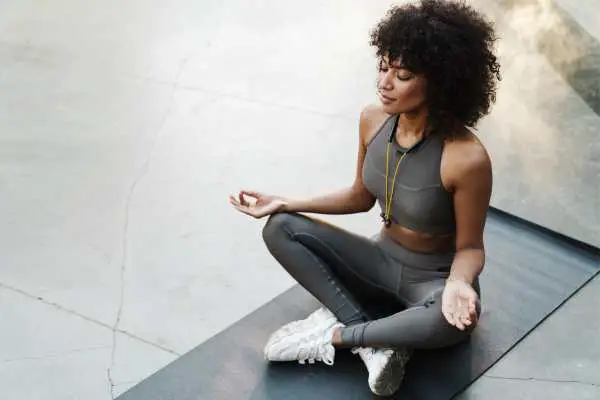Hey there, sports fans! Today’s topic is all about how meditation can give athletes the winning edge. That’s right, you heard me correctly – meditation!
Now, I know what you might be thinking, “Isn’t that just for monks on top of mountains?” But trust me, meditation is not just for the spiritual types. In fact, athletes around the world are using meditation to enhance their performance and achieve their goals.
Let’s face it, sports are not just about physical strength and endurance. Mental toughness, focus, and resilience are equally important in achieving success. And that’s where meditation comes in.
Meditation can calm their mind so, athletes can better handle stress and anxiety, improve their focus and concentration, and even prevent injuries.
So, sit back, relax, and get ready to learn all about the benefits of meditation for athletes. From the origins of meditation to the latest technology available, we’ve got you covered.
And don’t worry, we’ll keep it interesting and even throw in a little humor here and there. After all, meditation doesn’t have to be all serious and somber – it can be fun and enjoyable too. So, let’s get started!

What is meditation?
All right, let’s dive into what meditation is all about. Meditation is a practice that has been around for centuries, originating from ancient Eastern traditions.
It involves training the mind to focus and become more aware of the present moment, allowing you to observe your thoughts and emotions without judgment.
Now, you may be wondering, “How can sitting and doing nothing benefit athletes?” Well, it turns out that the benefits of meditation extend far beyond just relaxation and stress relief.
Studies have shown that regular meditation practice can improve overall well-being, boost immune function, and even increase brain gray matter.
For athletes, meditation can be a valuable tool to enhance their mental game. By practicing meditation regularly, athletes can improve their focus, concentration, and mental resilience.
This can be particularly helpful during training and competition, where distractions and negative thoughts can impact performance.
So, whether you’re a professional athlete or just someone looking to improve your overall well-being, meditation is definitely worth exploring. With the many benefits it offers, it’s no wonder that more and more athletes are incorporating it into their training regimen.
The history of meditation and its use in sports
Let’s dive into the history of meditation and how it has been used in sports. Meditation has been around for centuries and has been used for spiritual and health purposes.
It’s believed to have originated in ancient India, with the earliest written record dating back to 1500 BCE.
Meditation has been practiced by many cultures throughout history, including Buddhist monks, Hindu yogis, and Taoist sages. In each of these traditions, meditation was used as a tool to enhance mental and physical health, increase spiritual awareness, and achieve enlightenment.
In recent years, meditation has gained popularity among athletes as a way to improve their performance. Many professional athletes, including LeBron James, Kobe Bryant, and Novak Djokovic, have incorporated meditation into their training regimens.
One reason for this is that meditation has been shown to improve focus, concentration, and mental resilience, which are all critical components of sports performance.
Additionally, meditation can help athletes manage stress and anxiety, which can be a significant factor in performance.
Overall, the historical roots of meditation and its recent popularity among athletes highlight the importance of mental training in sports performance.
Meditation provides a powerful tool for athletes to improve their focus, manage stress, and enhance their overall well-being, leading to improved athletic performance.

How meditation can improve focus and concentration during training and competition
Athletes know the importance of being able to focus during both training and competition.
In the heat of the moment, it can be easy to lose concentration and make mistakes that can cost valuable points or even lead to injuries. That’s where meditation comes in.
By practicing meditation regularly, athletes can train their minds to stay focused and at the moment.
Meditation teaches athletes to be aware of their thoughts and emotions without getting lost in them, allowing them to stay centered and composed under pressure.
One of the key benefits of meditation for athletes is that it helps improve their attentional control, which is essential for sports performance. Studies have shown that regular meditation practice can improve cognitive performance, including working memory, processing speed, and attentional control.
Take Novak Djokovic, for example. The tennis superstar has credited meditation as a key factor in his success on the court. He has said that meditation has helped him improve his concentration and mental toughness, allowing him to perform at his best even in high-pressure situations.
Other athletes have also seen the benefits of meditation when it comes to focus and concentration. The NBA’s Kobe Bryant and the NFL’s Russell Wilson are both known to practice meditation regularly and have credited it with helping them stay focused and composed during games.
Incorporating meditation into an athlete’s training regimen can help them build the mental resilience needed to perform at their best, even when the pressure is on.
By training their minds to stay focused and in the moment, athletes can improve their performance, avoid distractions, and stay injury-free.
Meditation as a tool for managing stress and anxiety in sports
Sports can be stressful, and anxiety is a common experience among athletes. The pressure to perform at the highest level, deal with competition, and manage the physical demands of training and competition can be overwhelming.
Additionally, injuries and setbacks can cause further stress and anxiety.
Fortunately, meditation can be a powerful tool to manage stress and anxiety and help athletes stay calm and focused.
Meditation can help athletes manage stress and anxiety by increasing their awareness of their thoughts and emotions. With meditation, athletes can develop the ability to observe their thoughts and emotions without judgment, allowing them to become less reactive and more resilient to stress.
Meditation can also improve the ability to regulate emotions and reduce the negative impact of stress on the body.
Many athletes have used meditation to overcome stress and anxiety. For example, the famous NBA coach Phil Jackson introduced meditation to his players to help them manage stress and improve their performance.
Olympic gold medalist Michael Phelps has also credited meditation with helping him manage his anxiety and stay focused.
Overall, meditation is a valuable tool for athletes to manage stress and anxiety and improve their mental resilience. By developing meditation practice, athletes can become more aware of their thoughts and emotions, regulate their stress responses, and stay calm and focused in the face of challenges.

The Role of Meditation in Enhancing Athletic Performance
Athletic performance is not just about physical strength and endurance; it also involves mental toughness and focus. This is where meditation comes in as a powerful tool to help athletes enhance their overall performance.
Mental training is an integral part of sports performance, and meditation can help athletes develop the mental skills needed to excel in their sport.
Through regular meditation practice, athletes can learn to focus their attention, remain calm under pressure, and develop mental resilience.
Many successful athletes have incorporated meditation into their training regimens, including Kobe Bryant, Michael Jordan, and Novak Djokovic. These athletes have recognized the importance of mental training and the benefits that meditation can provide in enhancing their performance.
Research has shown that meditation can improve cognitive functions such as attention and working memory, which are critical for sports performance. Athletes who meditate regularly can develop better concentration skills, which can help them remain focused on their performance during training and competition.
Meditation can also help athletes manage stress and anxiety, which are common challenges that athletes face. By learning to control their thoughts and emotions, athletes can develop a greater sense of calmness and confidence, which can translate into improved performance.
Furthermore, meditation can help athletes stay present and focused during competition. Being in the present moment is essential for sports performance, as it allows athletes to react quickly to their environment and make split-second decisions.
Through mindfulness meditation, athletes can train their minds to stay present and focused, even in high-pressure situations.
In conclusion, meditation can be a powerful tool for athletes looking to enhance their overall performance. By improving concentration, managing stress and anxiety, and staying present and focused, athletes can achieve a higher level of mental toughness and resilience, which can translate into improved physical performance.
Meditation and Injury Prevention in Sports
Athletes are constantly pushing their bodies to the limit, and injuries can be a common occurrence.
While proper technique, warm-ups, and recovery protocols are all important for injury prevention, meditation can also play a role in keeping athletes healthy.
Meditation can help athletes prevent injuries by improving body awareness and reducing stress. By developing a greater sense of body awareness through meditation, athletes can learn to recognize when they are pushing themselves too hard and adjust accordingly.
This can help them avoid overuse injuries, which are common in many sports.
In addition, meditation can help reduce stress and tension in the body, which can also contribute to injury. When the body is under stress, it is more prone to tightness and stiffness, which can lead to strains and sprains.
By practicing meditation regularly, athletes can learn to manage their stress levels and keep their bodies more relaxed and flexible.
There are also specific meditation techniques that can help prevent injuries in certain sports. For example, visualization can be used to help athletes practice proper technique and prevent injuries caused by poor form.
By visualizing themselves performing a skill correctly, athletes can improve their muscle memory and reduce the risk of injury.
Overall, incorporating meditation into an athlete’s training regimen can be a valuable tool for injury prevention.
By improving body awareness, reducing stress, and practicing specific techniques, athletes can stay healthy and perform at their best.

Meditation as a Recovery Tool for Athletes
As any athlete knows, recovery is an essential part of training. Without proper recovery, athletes can suffer from fatigue, soreness, and even injuries.
That’s where meditation comes in. Meditation has been shown to be an effective tool for promoting recovery in athletes.
Studies have shown that meditation can help reduce inflammation and improve immune function, both of which are important for recovery.
In addition, meditation can help reduce stress and anxiety, which can interfere with recovery by increasing muscle tension and impairing sleep.
One study found that athletes who practiced meditation regularly reported better sleep quality, less fatigue, and fewer symptoms of overtraining.
Another study found that athletes who practiced mindfulness meditation had lower levels of cortisol, a stress hormone that can interfere with recovery.
But how exactly does meditation help with recovery? For one, it helps promote relaxation, which can help reduce muscle tension and promote healing.
In addition, meditation can help improve circulation, which can help speed up the delivery of nutrients and oxygen to muscles.
Finally, meditation can help improve mental clarity and focus, which can help athletes stay motivated and committed to their recovery routines.
Overall, incorporating meditation into your recovery routine can be a powerful tool for enhancing your overall well-being and performance as an athlete.
Different types of meditation practices for athletes to explore
Meditation isn’t a one-size-fits-all practice. There are many different types of meditation techniques that athletes can explore to find the one that works best for them. Here are some of the most popular meditation practices for athletes:
1. Mindfulness meditation:
This practice involves focusing on the present moment and becoming aware of your thoughts and emotions without judgment. Mindfulness meditation can help athletes stay focused and calm during training and competition.
2. Transcendental meditation:
This type of meditation involves repeating a mantra to achieve a deep state of relaxation and inner peace. Transcendental meditation can help athletes reduce stress and anxiety and improve mental clarity.
3. Loving-kindness meditation:
This practice involves generating feelings of love and compassion towards oneself and others. Loving-kindness meditation can help athletes cultivate a positive mindset and improve their relationships with teammates and coaches.
4. Body scan meditation:
This technique involves systematically scanning the body for tension and releasing it through deep breathing and relaxation. Body scan meditation can help athletes release physical tension and improve their body awareness.
5. Visualization meditation:
This practice involves using mental imagery to visualize oneself achieving a goal or performing at one’s best. Visualization meditation can help athletes build confidence and prepare mentally for competition.
It’s important for athletes to explore different types of meditation practices and find the one that works best for them. Some athletes may prefer guided meditations, while others may prefer to meditate in silence.
The key is to find a practice that resonates with you and stick with it. With consistent practice, meditation can become a valuable tool for enhancing your performance and overall well-being.
How to Incorporate Meditation into an Athlete’s Training Regimen
Now that we have discussed the benefits of meditation for athletes, you might be wondering how to incorporate it into your training regimen.
While it may seem intimidating at first, meditation can be an easy and enjoyable addition to your daily routine with some practice.
Here are some tips to help you get started with incorporating meditation into your training regimen:
- Find a quiet and comfortable space:
It is important to find a quiet and comfortable space where you can meditate without any distractions. You can use a meditation cushion or a chair to sit on during your practice.
- Set aside time:
Find a time during the day when you can consistently practice meditation. It can be in the morning, before a workout, or at night before bed.
Aim for at least 5-10 minutes of meditation to start and gradually increase the time as you get more comfortable.
- Focus on your breath:
One of the easiest and most effective ways to meditate is by focusing on your breath. Close your eyes and take deep breaths, focusing on the sensation of the breath moving in and out of your body.
Whenever your mind wanders, gently bring it back to your breath.
- Use guided meditations:
If you are new to meditation, guided meditation can be a helpful tool to get started.
There are many free meditation apps and resources available online that offer guided meditations for athletes.
- Make it a habit:
Like any other form of training, consistency is key. Try to make meditation a daily habit by scheduling it into your routine. It can be helpful to have an accountability partner or coach to help you stay on track.
Incorporating meditation into your training regimen can have a significant impact on your athletic performance and overall well-being. By taking the time to practice mindfulness and mental training, you can improve your focus, reduce stress and anxiety, and enhance your recovery. So why not give it a try?

Meditation technology for athletes to achieve the best performance
In recent years, technology has made it easier for athletes to incorporate meditation into their training regimen.
Meditation apps, virtual reality headsets, and brain-sensing devices are just a few examples of the types of technology available to help athletes achieve the best possible performance.
Meditation apps such as Headspace and Calm provide guided meditations that athletes can listen to during their training or competition. These apps offer a variety of meditations, ranging from basic mindfulness to visualizations and breathing exercises.
Virtual reality headsets provide a more immersive meditation experience, allowing athletes to escape their surroundings and fully immerse themselves in a peaceful environment.
Brain-sensing devices, such as Muse and Emotive, use sensors to track brain activity and provide real-time feedback on the quality of meditation. These devices can be particularly helpful for athletes who are new to meditation and may struggle to focus their minds.
By providing feedback on brain activity, these devices can help athletes develop their meditation practice and improve their mental focus.
While technology can be a useful tool for athletes looking to incorporate meditation into their training regimen, it’s important to remember that meditation is ultimately a personal practice. Athletes should experiment with different types of technology and find the tools that work best for them.
Moreover, athletes should also be careful not to become too reliant on technology and to continue developing their own meditation practice independently.
Technology can be a helpful tool, but it should not replace the personal discipline and focus that is necessary for successful meditation practice.
Overall, meditation technology provides athletes with a unique opportunity to enhance their meditation practice and achieve the best possible performance. By experimenting with different tools and finding the ones that work best for them, athletes can develop a personal meditation practice that helps them stay focused, relaxed, and mentally resilient.
Does meditation have any unfavorable impacts on athletes?
While the benefits of meditation for athletes are numerous, there are some potential downsides to keep in mind.
One common challenge that athletes may face is finding the time and motivation to meditate consistently. This can be especially difficult for athletes who have busy training schedules or who are traveling frequently for competitions.
Another potential issue is that some athletes may struggle to find the right type of meditation that works for them. With so many different meditation techniques and styles available, it can be overwhelming to know where to start.
Additionally, some athletes may find it difficult to quiet their minds or focus during meditation, which can be frustrating and discouraging.
It’s also important to note that meditation is not a substitute for other forms of medical treatment or therapy.
While meditation can be a helpful tool for managing stress and anxiety, athletes who are struggling with mental health issues should seek professional help from a licensed therapist or psychologist.
Despite these potential challenges, the benefits of meditation for athletes far outweigh any potential downsides. By finding the right meditation technique, creating a consistent practice, and seeking support when needed, athletes can maximize the benefits of meditation and improve their overall well-being and athletic performance.
Conclusion
Congratulations, you made it to the end of the article! We hope that you found this comprehensive guide to the benefits of meditation for athletes informative and insightful.
To summarize, meditation is a powerful tool that can help athletes enhance their performance by improving their focus, concentration, mental resilience, and overall well-being.
We discussed the historical roots of meditation and how it has gained popularity among athletes in recent years. We also explored the scientific research on the benefits of meditation for athletes, including how it can help athletes manage stress and anxiety, prevent injuries, and improve their recovery.
Moreover, we looked at different types of meditation practices that athletes can explore and how to incorporate meditation into an athlete’s training regimen. We also discussed the role of meditation technology in enhancing meditation for athletes.
While there are potential downsides or risks of meditation for athletes, such as the difficulty of finding time to meditate, we provided tips for overcoming these challenges.
In conclusion, we encourage athletes to explore meditation as a tool to enhance their performance and overall well-being. Mental training is an integral part of sports performance, and meditation is a powerful way to train your mind to achieve your goals.
Remember, meditation is not a one-size-fits-all practice, so find what works best for you and stick with it. With dedication and practice, you can develop a powerful meditation practice that will help you achieve your full potential as an athlete.
Frequently Asked Questions
How often should athletes meditate?
There is no one-size-fits-all answer to this question as it depends on the individual athlete’s needs and preferences. Some athletes may benefit from meditating daily, while others may find that a few times a week is enough to see results.
It’s important to remember that consistency is key, so finding a schedule that works for the athlete and sticking to it is important for reaping the benefits of meditation.
Additionally, some athletes may find it helpful to meditate before a competition or game to help calm their nerves and improve focus.
Can meditation increase muscle growth?
While meditation may have many benefits for athletes, including improved focus, reduced stress, and enhanced recovery, it is unlikely to directly increase muscle growth. Muscle growth primarily results from progressive overload during resistance training and adequate nutrition.
However, by reducing stress and improving recovery, meditation may indirectly support muscle growth by helping athletes to train more consistently and with greater intensity.
Can meditation replace exercise?
While meditation can offer many benefits, it cannot replace the physical benefits of exercise. Regular exercise is important for maintaining cardiovascular health, building muscle, and improving overall physical function.
Meditation, on the other hand, is a mental practice that can help reduce stress and anxiety, improve focus and concentration, and promote relaxation. Both meditation and exercise are important components of a healthy lifestyle and should be incorporated into a well-rounded wellness routine.




